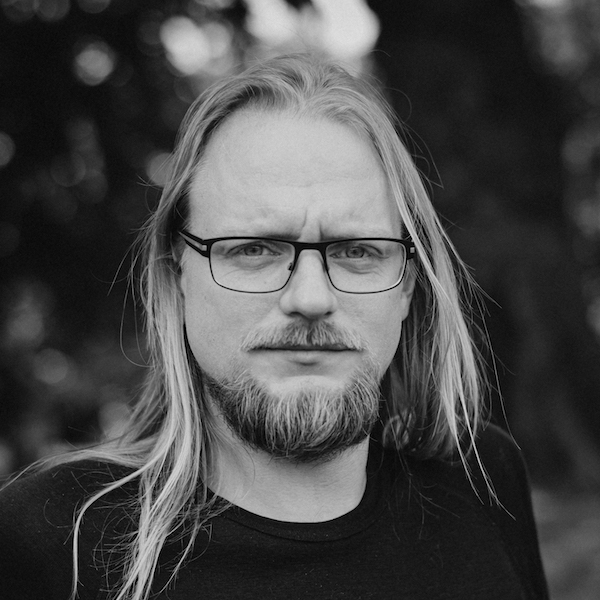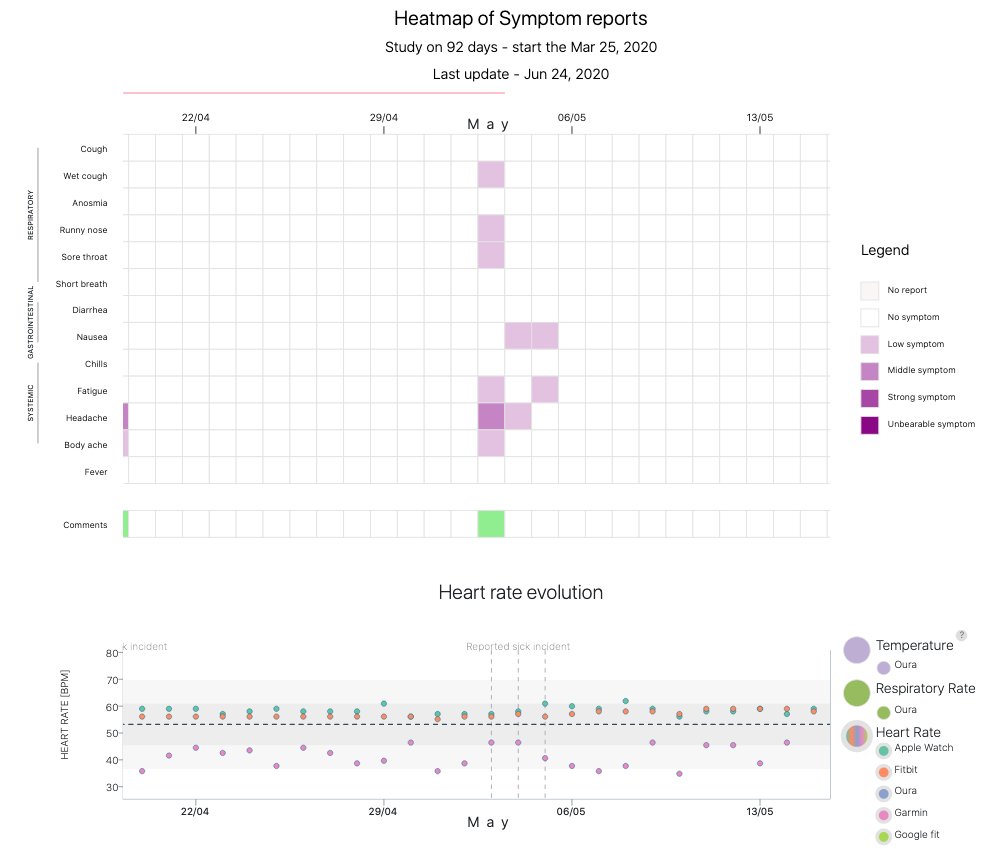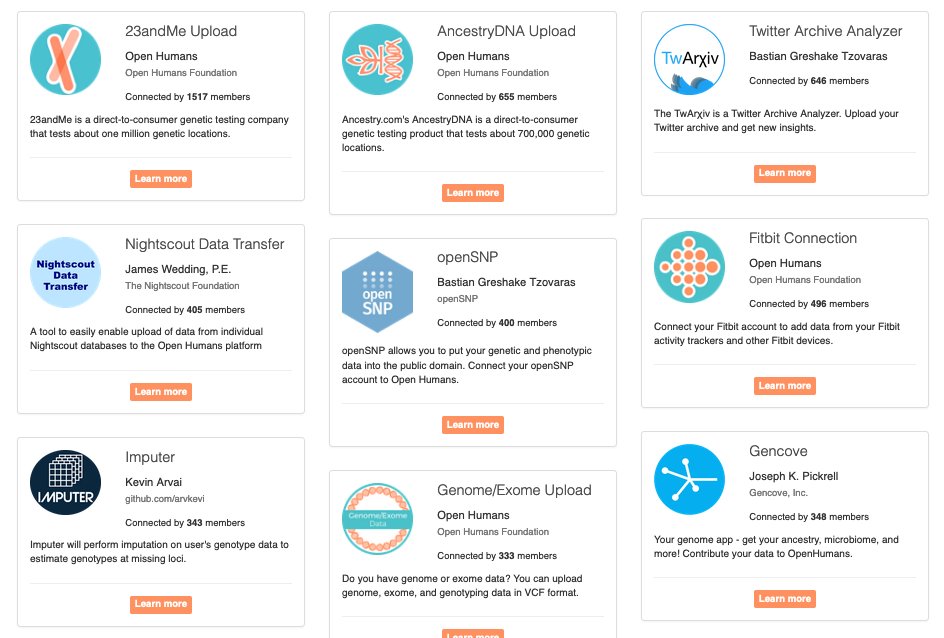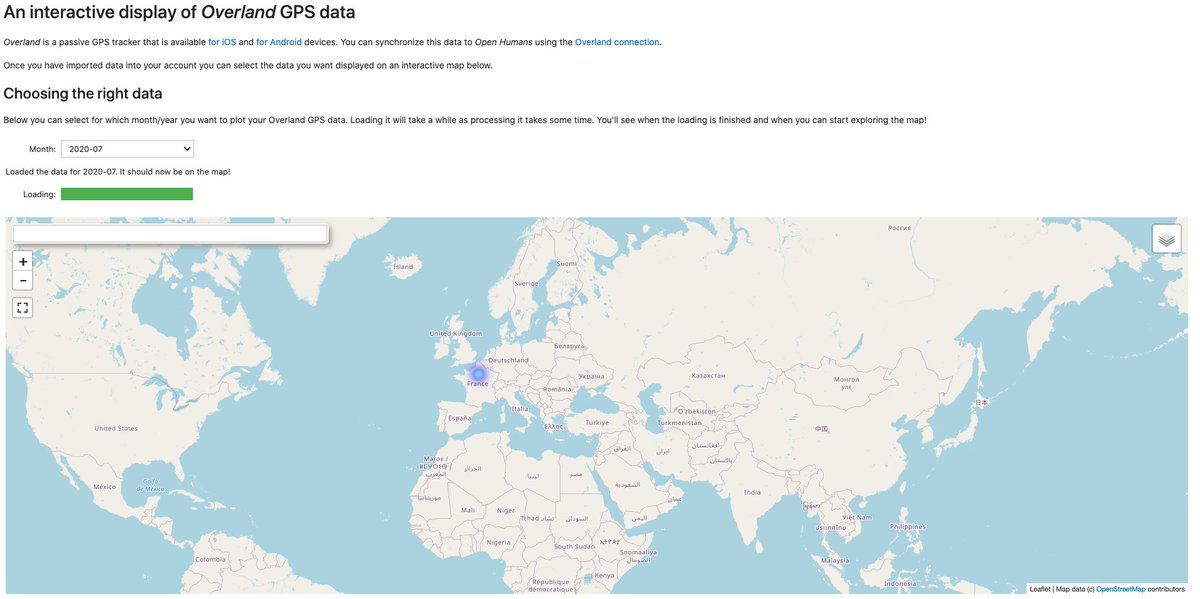Bastian
Jul 1, 2020
This week: Please welcome Bastian Greshake Tzovaras, @gedankenstuecke Director of Research for @OpenHumansOrg, @openSNPorg co-founder and research fellow at the Center for Research & Interdisciplinarity in Paris, @criparis. https://t.co/F8phluqdTk
Thank you, Bastian! https://t.co/rUqplQ8XD4

Jul 1, 2020
Good morning from Paris. I’m super excited that I get to share some of the FOSS work that we’re doing with @criparis and @OpenHumansOrg over the course of this week!
Jul 1, 2020
One of the big projects we are currently working on is https://t.co/LTvM7sTgYP. It’s a community project to generate personal insights on whether wearable devices can warn us when we’re having an infection. The project originated right out of the @OpenHumansOrg community calls!
Jul 1, 2020
The idea for it came during the early days of the pandemic in March and since then we’ve been busy creating the tools needed for it. Just by chance we (@madprime @agaricus & me) presented the project yesterday. You can watch the recording at https://t.co/7HCwatT1wN
Jul 1, 2020
@jwildeboer @josp0001 @OpenHumansOrg @zoobab We recently started playing around with the Bangle.js from @Espruino and the device is very promising!
Jul 1, 2020
@BigDaddyLinux @criparis @OpenHumansOrg Thanks! We have seen a lot of open science/FOSS efforts since the start of the pandemic. The @opencovid19 initiative has a nice collection of projects that includes open software/hardware as well as biotechnology!
Jul 1, 2020
Not exactly the best day to start tweeting about FOSS: My laptop finally stopped to work at all (I saw it coming, more and more ports were dying).😂
Luckily the IT of @criparis could offer a temporary replacement. So it ended being a day full of installing software/tools!
Jul 1, 2020
My minimal tool chain to get back to testing & reviewing pull requests for #QuantifiedFlu and some other Django-based projects: brew for general package management and conda for python. Then redis & postgres, pipenv for python environments, heroku CLI and we’ll see what I forgot!
Jul 1, 2020
I wish the MNT Reforms – an open hardware & software laptop by @mntmn – would already be out in the wild. That would have made replacing the broken boards an easy task, no such luck with a MacBook. Check out the state of the MNT Reform, a great project! https://t.co/SULOBbIAOD
Jul 2, 2020
Setting up the whole development environment was more work than expected, but I’m finally back to doing some work! The first item on my todo was reviewing pull requests. Which is a great opportunity to highlight how important it is to have a community when doing FOSS.
Jul 2, 2020
The pull request I just merged and deployed was by Basile – an intern with me at @CriResearch (he’s not on Twitter unfortunately). His whole internship is contributing to our FOSS efforts with #QuantifiedFlu. He creates dynamic personal data visualizations with d3. https://t.co/W8uousLlOL

Jul 2, 2020
Thanks to his efforts people can now explore their changes in respiratory rate, body temperature and heart rate in the context of the symptoms they report! And Basile isn’t the only great contributor that makes the project possible, there are many more!
Jul 2, 2020
For example: @_sandtweets integrated the APIs of Google Fit and Garmin, to enable users of those devices to use https://t.co/LTvM7sTgYP. And Lukasz Baldy (not on Twitter either) contributed a whole iOS application for using data from Apple Health (of course it’s FOSS too!)
Jul 2, 2020
@josp0001 @CriResearch Yes, people can opt-in into getting daily emails to report symptoms at a time of their choice. This email has two links: “No symptoms”, in that case it’s just a click and you’re done for the day. And “I have symptoms”, in which case you get that brief survey.
Jul 2, 2020
@josp0001 Check out the work done by @nobismhealth. They have a customizable iOS/Android app designed for tracking cluster headaches. They use @OpenHumansOrg for private data storage. Unfortunately the app isn’t FOSS (yet? :))
Jul 2, 2020
In the last days I’ve been playing around with the @Espruino Puck.js and Bangle.js – wonderful open source hardware projects – quite a lot. They have a ton of potential for #quantifiedself projects.
Finally wrote up my first little project with it! https://t.co/uxCCZaiEAr
Jul 3, 2020
This is a good chance to talk a bit more about what we’re doing with @OpenHumansOrg and why building FOSS infrastructure is central to our mission! Stick along for a small thread! 🧵 https://t.co/AHHqWEwPHC
Jul 3, 2020
Our goal is to enable people to do research around their own data, this can be in the n=1/quantified self/self-research/personal science style (like in the presentation above) but also in group settings. And all of this while giving people control over if/how to share their data.
Jul 3, 2020
To do this we’ve implemented a private personal data store which lets you import data from a lot of different personal data sources: Wearables, GPS records, social media usage, symptom tracking, genetic data, glucose monitoring. And it’s modular, you can make your own importers! https://t.co/M2YwpIbccF

Jul 3, 2020
There are open APIs to create data imports and also access your data. But for all the data you import you are in control of how to use this data: You can keep it private and just use it yourself, share it with individual projects, or even make some of it publicly available.
Jul 3, 2020
The whole data store we created is built using Django and a whole set of other FOSS libraries. And of course it’s FOSS itself, you can see exactly how it’s done at https://t.co/Y8Tmh6NFEb
Jul 3, 2020
But once you’ve centrally stored your data, what can you do with it? Let’s have a look at some use cases. The first one is exploring your data privately. Open Humans runs its own JupyterHub (another wonderful FOSS project!), allowing you to write data analyses in Python/R/Julia.
Jul 3, 2020
@OpenHumansOrg When you use that JupyterHub you get your own little virtual machine that has access to all of your private data. Thanks to @betatim for helping us tremendously with the setup of it! But the most fun part is: You can actually share those notebooks with others!
Jul 3, 2020
@gedankenstuecke If you press ‘Open" (e.g. on https://t.co/xR1GytW8o3) it will launch the same notebook in your own virtual machine, with access to all of your private data! That makes all notebooks reproducible & re-useable. This is all thanks to the shared API and standardized file store.
Jul 3, 2020
By default it even opens up in a Dashboard view (powered by Voila), which means you can even create interactive displays. But of course you can also go to the code-view and edit a notebook (e.g. to adapt it to your needs, fix bugs etc) and then even re-publish it! https://t.co/qh2W9z7yFD

Jul 3, 2020
This is a tremendous step towards scaling up self-research efforts, as they are not limited to individuals doing one-off things anymore, running the same kind of analysis with your own personal data is only two clicks away!
Jul 3, 2020
This covers the individual use, but in many cases the real power of our data comes if we do share it - responsibly with a project/ asmall group of people. Projects could be academics that want to do citizen science, but eg also patient-groups that want to do collective research!
Jul 3, 2020
I might come back to the academic use case. But let’s talk about the much more exciting patient-group case. @danamlewis & her work with @OpenAPS are an great example: https://t.co/nBx939BVbf
Jul 3, 2020
The ‘open artificial pancreas system" reduces the burden of Type 1 diabetes by linking up a continuous glucose monitor to an insulin pump to automate the administration of insulin when needed. As the name implies, it’s FOSS: https://t.co/1JwPbwMAp3
Jul 3, 2020
Hundreds of people around the globe are now running such DIY APS systems. To share this data and make it available the openAPS community is running a community-led data commons that allows researchers to apply for access to the collected data: https://t.co/gKruqvnM9C
Jul 3, 2020
Their data commons uses Open Humans for the data sharing: Individuals that use an openAPS setup can set it up to privately export the data to Open Humans, but members can also opt-in to share that data with the data commons, enabling a collective use of the data.
Jul 3, 2020
My vision for @OpenHumansOrg is to enable people to easily scale from n=1 to those collective data use cases: Start out by exploring your own data, observe something interesting, have others reproduce it on their data and if it’s still interesting go and make it a group effort!
Jul 7, 2020
I promised to come back to the topic of academic-led citizen science. Despite being an academic doing research on citizen science, I’m often not very happy of how those projects are being facilitated and who profits from them, as they can easily end up as ‘unpaid micro work".
Jul 7, 2020
Which means that ‘citizen science" in academia is little more than “mechanical turk, but without at least getting paid”. One of the first digital citizen science projects - “Clickworkers” by NASA - already makes that very clear in the name of the project itself.
Jul 7, 2020
Another big question is what happens to the outputs of the labor that participants volunteer? Often the data is not published openly, so the only people really benefiting are the researchers, while the volunteers get very little except the warm fuzzy feeling of ‘doing good".
Jul 7, 2020
These issues are especially relevant when citizen science is done in fields that directly impact people and where speed matters (think of environmental monitoring, health, climate change,…)
Which is why my research focuses on how to implement FOSS strategies in citizen science
Jul 7, 2020
We’re looking into how the ideas of commons-based peer production (https://t.co/TiynPG1rQt) can be better applied in this setting. As it’s not just about open code/data, but also governance and meaningful project ownership. There are plenty of lessons to be learned from FOSS.
Jul 7, 2020
Governance plays a role on many levels. When it comes to our work with Open Humans, data governance is central. Indeed, @madprime and I wrote an open book chapter on alternative data governance models: https://t.co/0OQ2eOab7x
Jul 7, 2020
But beyond having control over your own data, it’s also a matter of governing the platforms, which is why we make the members of Open Humans central to that too. Members review new projects/studies and even elect parts of the board of the non-profit.
Jul 7, 2020
There are many ways to structure citizen science projects (see the Characteristics of Citizen Science at https://t.co/LImAvcoYgD)
To me co-creation and community-leadership can be great at improving the impact of citizen science projects. And there are some nice examples.
Jul 7, 2020
One very nice project we’re contributing too as well is a fully co-created project on how to improve environments for autistic people. It’s currently in the design phase and the community has been involved from the start. It’s all transparent & open on GH: https://t.co/iAd6OpJsNA